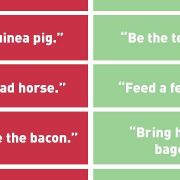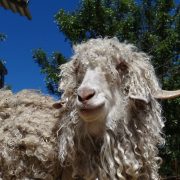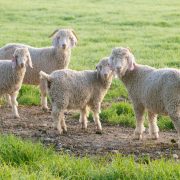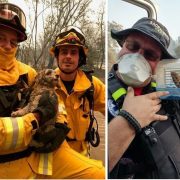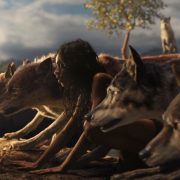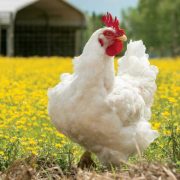‘Bring Home the Bagels’: We Suggest Anti-Speciesist Language—Many Miss the Point
Written by | December 7, 2018
Earlier this week, we took to Facebook, Twitter, and Instagram to ask people to start “bringing home the bagels” instead of the “bacon.”
Judging by some folks’ reactions, you’d think we had opened a can of worms Pandora’s box.
We figured that with so much negativity in the world, why not lighten up, smile a little more, and use language in a way that encourages kindness to animals?
But rather than seizing the opportunity to perpetuate positive attitudes toward others, some folks lost their damn minds. You’d think we had stolen their holiday cookies or something! Many resorted to bashing and attacking us. And then there were those who just completely missed the point.
Words Matter
None of us would support dogfighting. Yet people use the expression “I don’t have a dog in this fight.” And if people want to cling to phrases like “There’s more than one way to skin a cat,” they should really consider that it makes most people cringe. And not only is hurling insults such as “pig,” “whale,” “snake,” and “dog” hurtful to humans, it also denigrates and belittles nonhuman animals, who are interesting, feeling individuals.
There’s Plenty of Kindness to Go Around
Our society has worked hard to eliminate racist, homophobic, and ableist language and the prejudices that usually accompany it, but we must also address the pervasive speciesism. Suggesting that there are more pressing social justice issues that require more immediate attention is selfish. We at PETA don’t subscribe to such speciesist thinking. Why would we postpone addressing any one of these issues?
But plenty of people ARE taking the rose by the thorns.
Countless took to Twitter to echo our sentiment and offer other kind options:
OH MY GOD I JUST OVERHEARD SOMEONE ON A PHONE SAY “FEED TWO BIRDS WITH ONE SCONE”
THE PETA THING HAS LEGS, PEOPLE!!
— Sally Kuchar 📚💄🤷🏻♀️🦇 (@sallykuchar) December 7, 2018
.@PETA wants you to ‘bring home the bagel’ — not the bacon https://t.co/2ONIKhMl4o pic.twitter.com/X4E3ibpXjS
— JTA | Jewish news (@JTAnews) December 7, 2018
“Deep down, most people know the way animals are treated by factory farms is morally indefensible. But it’s easier to look the other way and mock the kooky vegans.”https://t.co/W9GMJKMlpE
— BuzzFeed News (@BuzzFeedNews) December 7, 2018
bigger knish to fry!
— emily shredded potatoes savage (@tofuandwhiskey) December 5, 2018
“More than one way to skin a cat” becomes “more than one way to pet a cat”
— jingle britt Ⓥ ❄️ (@brittpoteett) December 5, 2018
WIZARDS WIN! #WizHawks | #DCFamily pic.twitter.com/FfQPaXgux9
— Washington Wizards (@WashWizards) December 6, 2018
As BuzzFeed Opinion Editor Tom Gara said on Twitter:
“Our general culture around meat-eating is pretty clearly a thing future generations will look at with horror. It’s amazing that Twitter, where people are so inclined to write off previous generations for their badness, so gleefully dunks on PETA for being clueless.”
And as “vegan defender” Summer Anne Burton from BuzzFeed said:
“Deep down, most people know the way animals are treated by factory farms is morally indefensible. But it’s easier to look the other way and mock the kooky vegans.”
Animals are feeling, intelligent individuals capable of joy and suffering. They’re not here so that we can exploit them, and our language must evolve to reflect this.
Remove Speciesism From Your Daily Conversations
Cringeworthy words and phrases don’t belong in modern society. Our understanding has evolved, and our language should evolve with it.
Your words have the power to influence those around you.
We’re simply asking folks to use kinder words—don’t overthink it. Instead, click the button below for a few fun ideas:

